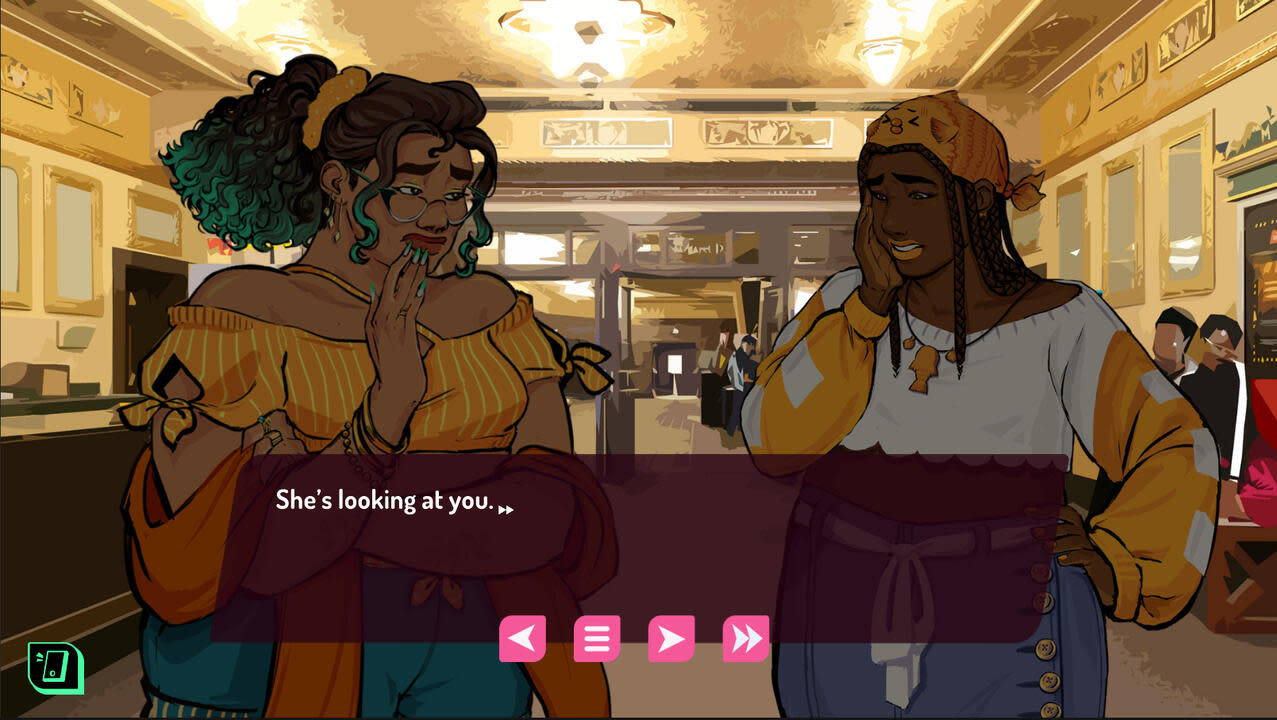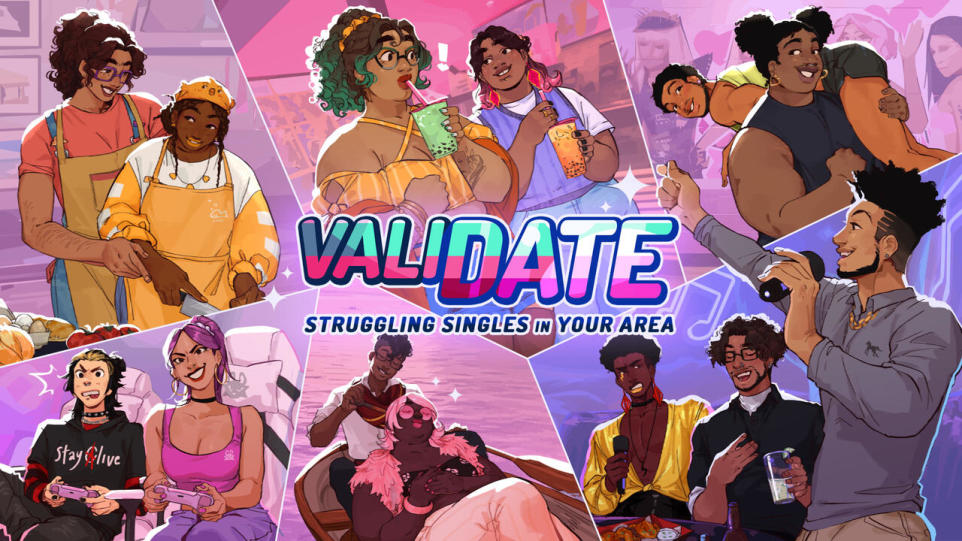Indie games have become increasingly popular in recent years, thanks to platforms like Steam, itch.io, and other online distribution channels that allow developers to release their games directly to players. ValiDate, a vibrant dating simulator and visual novel, follows a cast of thirteen struggling twenty-somethings as they navigate the messiness of love and life. Through mixtapes, poetry, and cosplay, players can help these characters on their path of self-betterment or enable their awful behavior and leave a trail of broken hearts behind them.
The most popular dating sims often feature cisgender and heterosexual relationships, wish fulfillment, and archetypal narrative arcs towards romance and marriage. ValiDate takes a messier and more realistic approach, honoring the agency, complexity, and flaws of its multiply marginalized characters. Dani Lalonders is the lead producer of ValiDate, and a narrative designer for Spirit Swap. In this conversation, we sat down with Dani to discuss how romance and pandemic alienation show up in ValiDate, the difficult process of funding visual novels, and making games by and for queer and trans people of color. Khadijah: One thing I noticed about the game is that it's very realistic—often realism for Black story means rehearsing scenes of subjection. I have kids, so I even noticed this with picture books. Everything is about Harriet Tubman or Rosa Parks. But Black joy and romance really take center stage in ValiDate. Can you share what influences in your life informed your approach to developing ValiDate?
Dani: ValiDate is very much realism! ValiDate was created because I felt like there was a lack of realistic media for people of color in their twenties. Typically when we get stories about people of color, particularly Black people, it's either teen media or thirties media, and there's a need for both. But there is very much a missing demographic that has a need to feel seen. ValiDate was birthed during the pandemic because we have been so isolated, so alone, during some of the most formative years.
Khadijah: Graphic novels heavily overlap with role playing games but there are more possibilities for interaction in the latter. Can you talk about the possibilities of gaming specifically, compared to other mediums?
Dani: Video games give players choice, which is what makes it so unique and so interactive compared to other mediums. [With books] you're reading it, but you're not really pushing the story further and you're not contributing to how the story ends. In video games, your choices directly affect how the story moves, what direction it will move, what the characters feel like. Graphic novels are phenomenal, and I love them very much. But you don't really have that same kind of interactivity with a book or TV show because it's already predestined for you.

Khadijah: Could you tell us about the tech stack that you used to develop the video game? I read that you didn't have previous game development experience. Can you walk us through the process from ideation to the finished product and the tools that you deployed?
Dani: ValiDate initially started in this visual novel engine called Renpy, and it was fine, but we just wanted to do something a little more. We moved it into Unity, which is another video game resource. Unity was better for how we wanted to make our game, how we wanted it to look.
We were able to expand more—with a fishing minigame, and a rhythm game, and a couple more in the near future. Unity is typically the most friendly platform for games who are trying to go onto consoles. We are on the Nintendo Switch, we're on Xbox, we're looking to get on PS4 and PS5 in the near future. With Renpy, it's pretty hard to do that. There is a lot more coding. With Unity, there's resources and shortcuts that we can use to help us get our game onto those platforms.
Khadijah: It sounds like the limitations of Renpy were about portability to other platforms as well as developing. Are there other things that you would wish for Unity or other tools that you would like to see built out in order to better be able to expand or translate your vision for ValiDate?
Dani: I'm not sure, because I'm not a developer. I'm just the project lead. Unity is very accessible and it's free. I wish I could have taken a Unity class on everything before starting development, but I've learned that Unity has a lot of great, free resources.
Khadijah: I’d love to hear more about your team. Who are they? How did you meet? What are the kind of roles that were required in order to make this happen?
Dani: I have a team of twenty-five. We're all queer people of color. We really put our own experiences into these characters. In video games, people of color are rarely placed in realistic situations and when we are, we are typically side characters or non-playable characters. When it comes to how our team came to be, it was just friends and then friends of friends. I love my team a lot!
Khadijah: That leads me to one of my other questions, which is—what a lot of companies say when we talk about producing Black content or content for people of color is like, “is this commercially viable?” Twenty-five is pretty huge. How did you initially finance the production of ValiDate? Is the revenue from people buying the game enough to sustain the team?
Dani: We initially financed through Kickstarter crowdfunding. We got really lucky that we financed at the time where people cared about Black people, and they wanted to give us a lot of money. So we had been somewhat financed initially, but never really secured proper financing, so we all kind of just decided to do it mostly for free. There were times where we got small grants. But now that the game’s out, we're purely running on sales. Sales are so unpredictable, they really vary month to month. It's something I wouldn't do again. I love what we do, but it's too stressful. With this production cycle, I would just like to have secure funding before we do anything. And with Black people… it's hard to get that kind of funding for a game like ValiDate because it's so “risky.” One of the biggest issues I ran into when I was pitching and trying to find investors and stuff like that is that our game is too risky. “Who is it for,” “we don't think it is going to sell well,” et cetera.
Khadijah: What is the economic model for independent video game development and sales? Is there a possibility that it would be completely sustained through revenue? Are most indie video games, even if they're white-led and doing something “safe,” getting funded?
Dani: It depends on the kind of game you're making. We made a visual novel. It's already a hard genre to get funding to. For other games, it's not as hard because they have a wide market appeal. The wider your market appeal is, the more likely you are to get funding and a publisher for it. That's just how it is—not just for indie [game developers], but for everyone. The kind of game you're making really will affect what kind of funding and support you get. Since visual novels don't have as much support, it's just harder for visual novel devs. But if I were making a game like Mario, I would probably get a lot more support because people like platformers1, they have a wider appeal.
Khadijah: You mentioned the capacity to get additional funding during the waves of white guilt after the execution of George Floyd—at the same time, during this time that you've been developing these games and particularly now, trans people have been under attack through a series of legislations, but also extrajudicial [violence], everyday people harassing them. As a team, how do you discuss things like transphobia and what's happening as you're developing the story?
Dani: I have mixed feelings. I try not to put anything really traumatic in our games because I just don't really see a point of it. We can tell our stories without having to rely on trauma and people facing -isms and phobias.
Khadijah: Yeah, I really appreciate that the game is not didactic and not like, “here's this form of discrimination and here's the moral at the end of the story.” Clearly the game is very thoughtful as it relates to fatphobia, colorism, transphobia. How does your team discuss among yourselves, and end up at this final point at which all of this is represented in the story? I also like that people's identity is not a plot device in and of itself. There's a story in which they are the subjects, but they're not a plot device just because they are dark skinned or light skinned or fat.
Dani: As a team, since we're all marginalized and queer, we treat the characters how we treat ourselves. We're trans. We're Black. As queer people of color, we face homophobia, transphobia, racism from ourselves, from our families, from our environments. But at the end of the day, we're still people with varied feelings and emotions. We're able to ignore these things. We're able to laugh at them. We're able to move past them. When it comes to a lot of media, for example, if you have a Black trans woman depicted, it's always her struggling. It's never showing her being loved, being embraced, having friendship. We wanted to really just stay away from that because we are more than what we face.
Khadijah: That's something that I really loved and appreciated about the game. Does the whole team come together to meet and discuss how a story is developed or is there a core group of people that are primarily doing the story development?
Dani: We have a team of writers—seven or eight of us. The original idea was created by myself and one of my best friends, Haven. We initially came up with it in 2019, in the summer.
Khadijah: What media, especially rom coms, influenced you all as you developed the game?
Dani: Insecure was one of my biggest influences. I liked how Issa approached dating and how you see Issa at her beginning, you see her at her end. I like that approach to storytelling, a linear story where you can really see how much Issa has changed. I really like that character progression. Ace Attorney, the video game, is another big inspiration. When I saw Black Lady Sketch Show, I loved how funny that show was. So I adapted more humor into ValiDate the best I could.
Khadijah: Are there any other video games that you're playing that you want to shout out or like other video game creators that we should look out for?
Dani: Oh, I'm really excited for a couple of games. Thirsty Suitors is a game I'm really, really excited for. And Venba! Those are two very rich, beautiful games.
Khadijah: Thank you for the work that you and everybody that you're working with is doing. This is really exciting. I am definitely in my thirties. I loved hearing that “don't forget about us, we need our own stuff, and we just lived through a very traumatizing pandemic.” I hear that. So thank you. Is there anything else you want us to include?
Dani: Buy our game!
1. Platformers are a popular genre of video games that usually requires the player to navigate between different points in an environment. The player has to maneuver across and between platforms that often feature uneven terrain, enemies, and obstacles.
